Intro
Discover the Amlodipine Besylate Medication Guide, covering dosage, side effects, and interactions. Learn about hypertension treatment, cardiovascular health, and managing high blood pressure with this calcium channel blocker medication.
Amlodipine besylate is a medication that has been widely used to treat high blood pressure and chest pain. It belongs to a class of medications known as calcium channel blockers, which work by relaxing blood vessels and increasing blood flow to the heart. High blood pressure, if left untreated, can lead to serious health issues such as heart disease, stroke, and kidney disease. Amlodipine besylate helps to reduce the risk of these conditions by lowering blood pressure and reducing the strain on the heart.
The importance of managing high blood pressure cannot be overstated. It is a condition that affects millions of people worldwide and can have severe consequences if not properly managed. Amlodipine besylate is one of the many medications available to help control high blood pressure, and it has been shown to be effective in reducing blood pressure and alleviating symptoms of chest pain. In addition to its use in treating high blood pressure, amlodipine besylate is also used to treat coronary artery disease, which is a condition where the arteries that supply blood to the heart become narrowed or blocked.
Amlodipine besylate works by blocking the entry of calcium into the muscle cells of the heart and blood vessels. This action helps to relax the muscles and reduce the contraction of the heart, which in turn lowers blood pressure and increases blood flow to the heart. The medication is usually taken once a day, and it can be taken with or without food. It is essential to take amlodipine besylate exactly as prescribed by a healthcare provider, as taking too much or too little of the medication can affect its effectiveness and increase the risk of side effects.
Amlodipine Besylate Uses
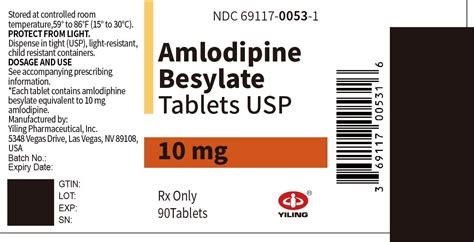
Benefits of Amlodipine Besylate
Amlodipine besylate has several benefits that make it a popular choice for treating high blood pressure and coronary artery disease. Some of the benefits include: * Lowering blood pressure and reducing the risk of heart disease and stroke * Relieving symptoms of chest pain and improving blood flow to the heart * Reducing the risk of heart attacks and strokes * Improving overall cardiovascular health * Being available in a variety of formulations, including tablets and capsulesAmlodipine Besylate Side Effects

Severe Side Effects of Amlodipine Besylate
While rare, amlodipine besylate can cause severe side effects that require immediate medical attention. Some of the severe side effects include: * Allergic reactions, such as hives and itching * Difficulty breathing and swallowing * Chest pain and tightness * Abnormal heartbeat and arrhythmia * Severe dizziness and faintingAmlodipine Besylate Dosage
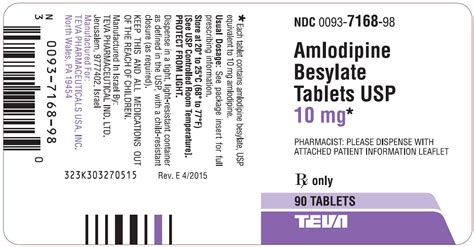
Interactions with Other Medications
Amlodipine besylate can interact with other medications, including: * Other blood pressure medications, such as beta blockers and diuretics * Cholesterol-lowering medications, such as statins * Anti-inflammatory medications, such as NSAIDs * Antibiotics, such as erythromycin and clarithromycin * Antifungal medications, such as ketoconazole and itraconazoleAmlodipine Besylate Warnings and Precautions
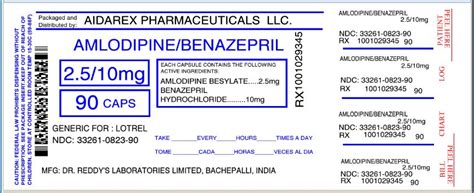
Pregnancy and Breastfeeding
Amlodipine besylate can be used during pregnancy and breastfeeding, but it is essential to consult a healthcare provider before taking the medication. The medication can pass into breast milk and may harm the baby, and it can also increase the risk of low blood pressure and other side effects in pregnant women.Amlodipine Besylate Overdose
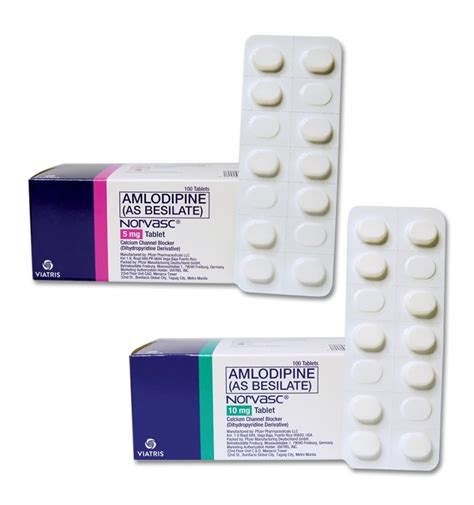
Symptoms of Overdose
The symptoms of an amlodipine besylate overdose can vary depending on the amount of medication taken and the individual's response to the medication. Some of the common symptoms of an overdose include: * Dizziness and lightheadedness * Headache and fatigue * Nausea and vomiting * Abdominal pain and diarrhea * Abnormal heartbeat and arrhythmiaAmlodipine Besylate Storage and Disposal
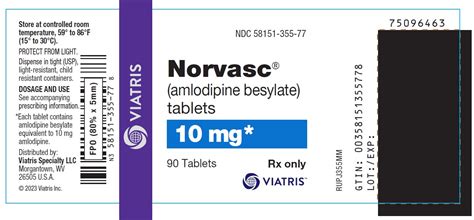
Proper Disposal
Proper disposal of amlodipine besylate is essential to prevent accidental ingestion and to protect the environment. The medication should not be thrown away in the trash or flushed down the toilet without proper disposal. Instead, it should be taken to a pharmacy that accepts unused medications or disposed of through a medication take-back program.What is amlodipine besylate used for?
+Amlodipine besylate is used to treat high blood pressure, coronary artery disease, and chest pain. It is also used to prevent certain types of heart attacks and strokes.
What are the common side effects of amlodipine besylate?
+The common side effects of amlodipine besylate include dizziness and lightheadedness, headache and fatigue, nausea and vomiting, swelling of the feet, ankles, and hands, and abnormal heartbeat and palpitations.
Can I take amlodipine besylate with other medications?
+Amlodipine besylate can interact with other medications, including other blood pressure medications, cholesterol-lowering medications, anti-inflammatory medications, antibiotics, and antifungal medications. It is essential to consult a healthcare provider before taking amlodipine besylate with other medications.
We hope this article has provided you with a comprehensive understanding of amlodipine besylate, its uses, benefits, and side effects. If you have any further questions or concerns, please do not hesitate to comment below. Additionally, if you found this article informative, please share it with others who may benefit from the information. Remember to always consult a healthcare provider before taking any medication, and to follow the recommended dosage and usage instructions to minimize the risk of side effects and maximize the effectiveness of the medication. By working together, we can promote better health and well-being for everyone.
